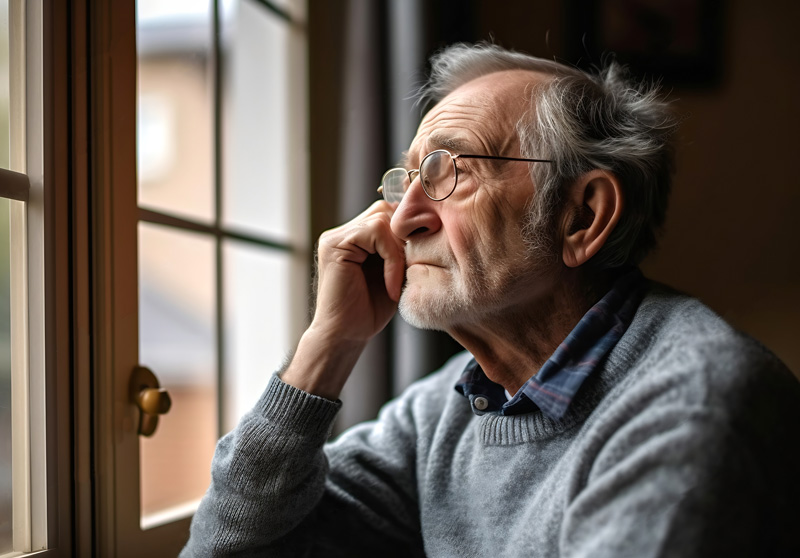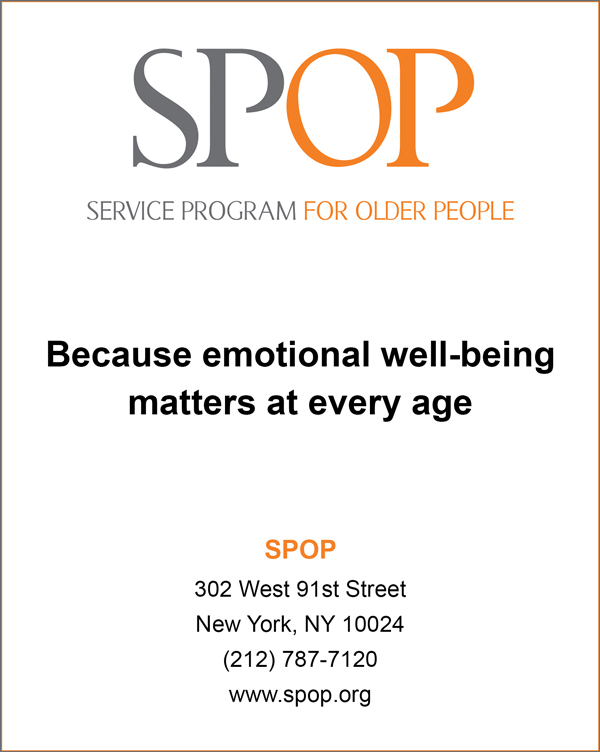In a review of data around suicidality, we see that older adults are highly vulnerable. The CDC reports that adults over age 45 account for more than 50% of deaths by suicide in the US, with the risk of suicide increasing with age. The national rate of suicide is highest among men over age 85 (45.9 per 100,000), and yet community-based mental healthcare programs for older adults remain scarce throughout the country.

At Service Program for Older People (SPOP), we are acutely aware of the risk of suicide and suicidality among older adults. SPOP is one of a handful of agencies across the country that focus entirely on community-based mental healthcare for older adults. Our overarching goal is to enable older adults to live their best lives, and we work in partnership with hospitals, aging services providers, and older adult centers to reach out to the most vulnerable and provide coordinated support.
Our clinic serves ages 55 and older, and many of our clients have at least one suicide risk factor, such as social isolation, chronic illness or pain, or complicated grief. Our clinical staff all receive training in protocols for treating suicidality, including a proprietary Distress Action Plan, which we developed as an alternative to traditional language to ensure a person-centered approach.
The Clinic has recently expanded staff capacity to provide trauma-centered psychotherapy and also launched two specialized programs for high-need clients: Enhanced Care, which offers short-term intensive intervention, and STRIVE, which provides individual case assistance, counseling, integration of addiction treatment and other aging-related services. These client stories show how our staff is addressing suicidality among older adults.
“Simon” is a 68-year-old male who came to SPOP to address symptoms of post-traumatic stress, suicidality, and social isolation. He is a 9/11 survivor and had received services in the past to treat his flashbacks, hypervigilance, and lack of motivation, but in recent months, was finding himself fantasizing about dying by suicide (car crash) and was worried that his disturbing thoughts, along with new sciatic pain that developed as he aged, might lead to a relapse of alcohol and cocaine use.
Using a holistic reflection on physical and emotional pain, his SPOP therapist provided education on the link between trauma and bodily pain. She encouraged Simon to see a physical therapist and join an exercise class at his local older adult center. She also taught him visualization exercises to practice while driving, helping him use dialectical behavior therapy skills to re-regulate when fantasizing about crashing. Simon has been practicing distress tolerance and has developed intentional phrases that he says out loud, reminding him of his overarching desire to get home safely.
Simon was ambivalent about talking through his fears of relapse and was concerned that talking about his urges with a professional would trigger an uncontrolled onslaught of cravings. His therapist connected him with an addiction treatment program where he was able to meet with a Certified Recovery Peer Advocate, who gave him tips on “urge-surfing” without having to speak with multiple recovery counselors.
After five months of treatment, Simon is now working to engage in a physically and socially active life. He takes his dog to the local dog run and reports that he hasn’t had images of crashing his car in several weeks. He is looking forward to joining a DBT skills therapy group, where he can meet other people who have survived traumas and learned to trust their own bodies again.
Albert, age 66, worked at the NYC Metropolitan Transit Authority for 30 years. He came to SPOP two years ago for support in managing symptoms of depression, suicidality, and alcohol use. When he fell behind in rental payments and faced eviction, we enrolled him in our STRIVE program, which offers extra supports for high-need clients. The STRIVE team helped him apply for a grant to cover his rental area, connected him to an addiction treatment program, and encouraged him to enroll in a weekly mood-boosting activity program at his local older adult center. When his rental assistance application was denied, we encouraged him to present his case at a hearing, which ultimately led to a successful decision.
The team also helped him to complete applications for his MTA pension, the NYC Senior Citizen Rent Increase Exemption program, and transportation services. With SPOP’s support, he is no longer suicidal, has achieved sobriety, and has secure housing.
Agnes is a 79-year-old woman who came to SPOP to help manage constant panic, tearfulness, and thoughts about suicide. She had no trust in her ability to cope with any of her intense feelings, felt isolated, and did not know how to get her needs met. Agnes was encouraged to enroll in SPOP’s Enhanced Care program to receive additional weekly support from a secondary clinician and regular check-in calls from a social work intern. She had developed a relationship with her primary clinician, but she was hesitant to connect with additional team members, fearing that “the more people who know that I think about overdosing, the more people that are going to try to hospitalize me.”
SPOP listened to her concerns, validated both her perceived loss of control as well as her actual loss of control, and confirmed that everyone’s shared goal was to help put the client back into her own driver’s seat. Agnes eventually decided to engage in Enhanced Care, where she designed her own Distress Action Plan (DAP), chose the affect regulation skills she wanted to learn and practice with her secondary clinician, and determined her intern call schedule. After eight weeks, Agnes reported a decrease in suicidal thoughts and is now consistently referencing her DAP when needed.
Suicide care and prevention for older adults is nuanced. We unequivocally want to make space for discussion and acceptance around death and dying; at the same time, however, we understand that older adults may have extreme ambivalence about dying by suicide. Our role as mental health professionals is to give them the freedom and support to talk about their pain while searching for reasons to live.
Catherine Thurston, LCSW, was appointed Chief Executive Officer of Service Program for Older People (SPOP) in July 2024, having previously served as Chief Program Officer for eight years. She has over 35 years of experience in gerontological social work, including serving as Chief Services Officer at SAGE/Service & Advocacy for GLBT Elders and as Director of Alzheimer’s Programs at the Cobble Hill Health Center. Catherine has published in the areas of Dementia and Long-term care and LGBT Aging and has sat on the New York State Caregiving Coalition, AARP’s Caregiving Committee, and the American Society on Aging’s LGBT Aging Network. She has served as Adjunct Faculty at the Silberman School of Social Work at Hunter College since 2016. She received her Masters of Social Work from Hunter College School of Social Work.
Visit www.spop.org to learn more about SPOP and its work as a community-based behavioral healthcare provider for older adults in New York City.





